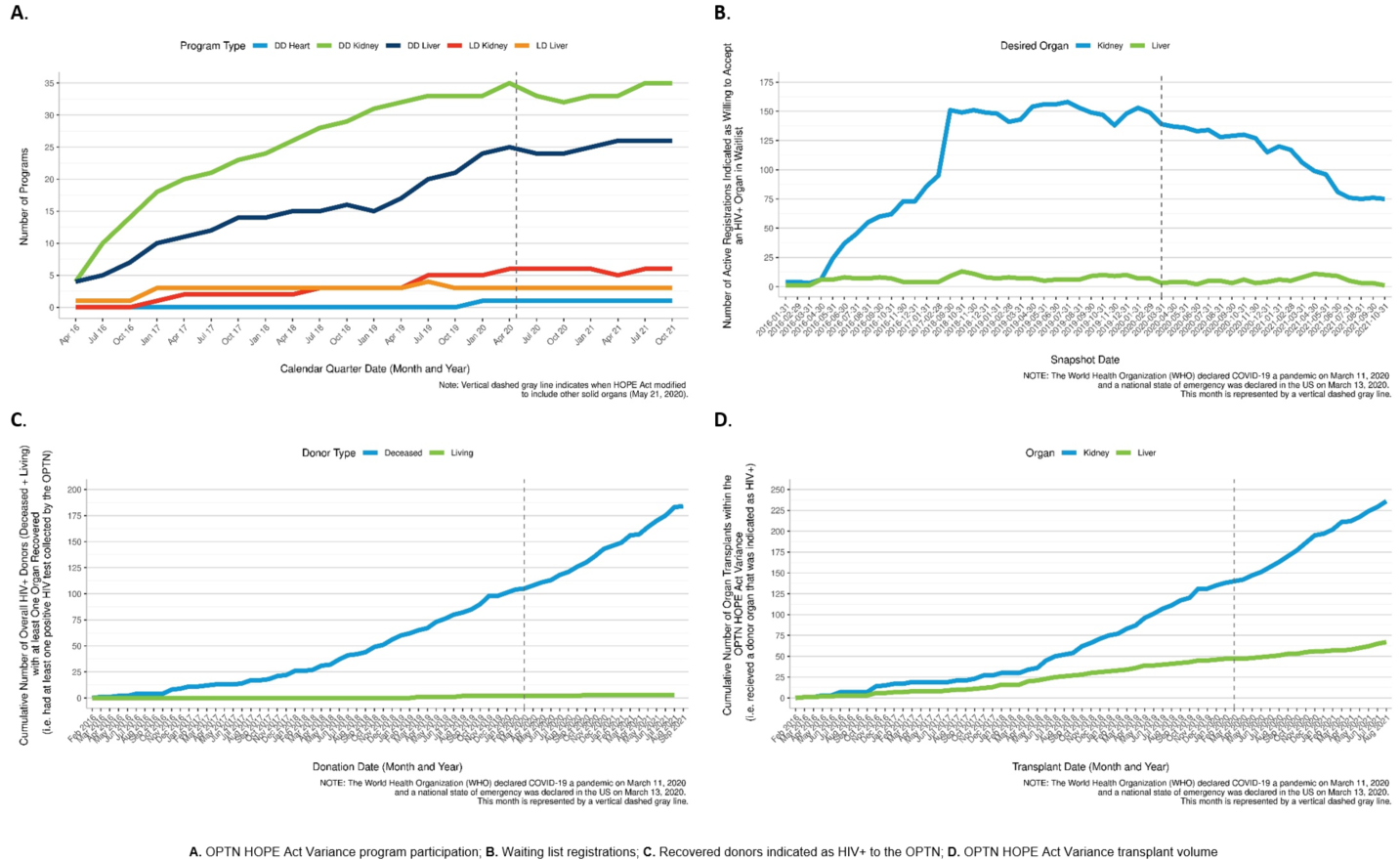Temporal Trends of Optn Hope Act Variance Participation
1UNOS, Richmond, VA, 2UPMC Children's Hospital of Pittsburgh, Pittsburgh, PA, 3Scripps Clinic & Scripps Green Hospital, La Jolla, CA, 4UMass Medical, Worcester, MA, 5Yale, New Haven, CT, 6UT Health Austin, Austin, TX, 7CUIMC/Presbyterian Hospital, New York, NY
Meeting: 2022 American Transplant Congress
Abstract number: 1321
Keywords: HIV virus, Kidney transplantation, Liver transplantation, Resource utilization
Topic: Clinical Science » Public Policy » 21 - Non-Organ Specific: Public Policy & Allocation
Session Information
Session Name: Non-Organ Specific: Public Policy & Allocation
Session Type: Poster Abstract
Date: Monday, June 6, 2022
Session Time: 7:00pm-8:00pm
 Presentation Time: 7:00pm-8:00pm
Presentation Time: 7:00pm-8:00pm
Location: Hynes Halls C & D
*Purpose: The Organ Procurement and Transplantation Network (OPTN) created a research variance allowing for transplantation of HIV+ donor kidneys and livers into HIV+ recipients after passage of the HIV Organ Policy Equity (HOPE) Act legislation in 2013 and subsequent published research criteria in November 2015. In May 2020 the OPTN modified the variance to include all solid organs.
*Methods: The OPTN database was used to analyze temporal trends in waiting list registrations, HIV+ donors, HOPE transplant recipients, and program participation in the OPTN HOPE Act variance. HIV+ donors were identified through HIV serology/NAT fields collected by the OPTN; recipients of these organs are HOPE recipients.
*Results: Transplant program participation saw consistent growth but has remained stable for the two years (Fig A). Despite this, patient demand for HOPE kidneys has been simultaneously declining, perhaps driven by a decline in listings related to Hypertensive Nephrosclerosis and DM Type II (listings for HIV Nephropathy remained stable), while liver demand remains low but stable (Fig B). Concurrently, there has been a consistent volume of recovered HIV+ donors and organs transplanted (Fig C, D). Transplant volume recently exceeded 300 organs transplanted (300 deceased donor, 3 living donor), largely driven by kidney (236 kidney, 67 liver; 11 SLK) from 187 recovered HIV+ donors. Living donation of HIV+ organs remains limited to kidney. Among HIV+ deceased donors, the kidney discard rate was 32% while the liver discard rate was 4%. Twenty-nine recovered deceased donors had no organs transplanted, and associated common discard reasons for these donors were exhausted match runs and biopsy findings.
*Conclusions: The OPTN database does not include HIV status at listing; therefore, the decline in demand cannot be attributed to potential access changes for HIV+ patients, but may be related to the impacts of the COVID-19 pandemic. The impacts of the COVID-19 pandemic have not noticeably affected HOPE Act transplant volumes, highlighting the resiliency of the US transplant system. Based on consistent activity and positive data and safety analyses through five years, the OPTN recommended removal of the research criteria as a potential barrier to expanded utilization of the HOPE Act to HHS, in turn making HIV-to-HIV transplantation standard of care; the result of that recommendation is pending.
To cite this abstract in AMA style:
Wilk A, Green M, Marsh C, Theodoropoulos N, Formica R, Turgeon N, Fox A, Wilhelm A, Klassen D. Temporal Trends of Optn Hope Act Variance Participation [abstract]. Am J Transplant. 2022; 22 (suppl 3). https://atcmeetingabstracts.com/abstract/temporal-trends-of-optn-hope-act-variance-participation/. Accessed February 17, 2026.« Back to 2022 American Transplant Congress

